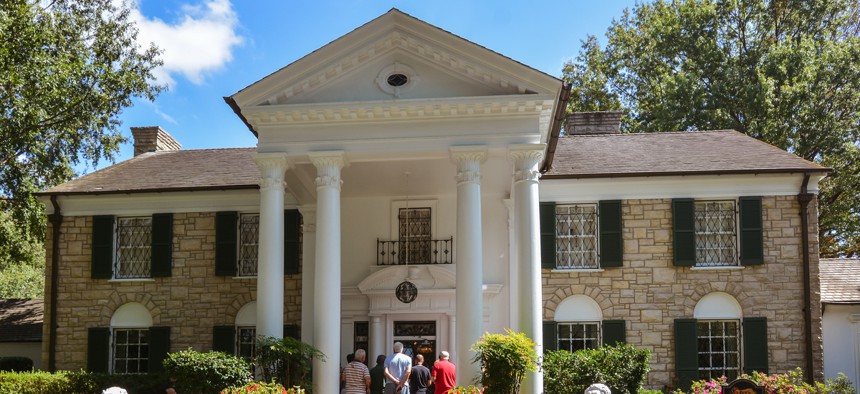An Economic Development Package for a Major Tourist Attraction

Graceland in Memphis, Tennessee. jejim/Shutterstock
STATE AND LOCAL ROUNDUP | Different and escalated citations for homeless people in Sacramento ... Rethinking fare evasion in Philadelphia ... Changes for drones in a New Jersey town.
A debate in Memphis over economic development incentives has focused on one of the city’s major tourist attractions: Graceland, the former home of Elvis Presley. The company that owns the property, Elvis Presley Enterprises Inc., wants tax breaks to move forward on a $100 million expansion that would include a 6,000-seat arena, a hotel expansion, an RV park and a manufacturing plant, the Wall Street Journal reported. The Memphis City Council is expected to vote on the breaks this month. Joel Weinshanker, the managing partner in the company, told the Journal the threat was real to relocate Graceland without a deal, saying they’ve had “substantial offers to take every piece of wood and panel and move it.” The local Commercial Appeal newspaper in March reported that the city and Elvis Presley Enterprises had inked an agreement to also reinvest $750,000 back in the Whitehaven community around Graceland as well as pay a “living wage” to employees. Earlier this month, a council member told the newspaper she believed these requirements could establish a new precedent for economic development efforts in the city. [Wall Street Journal; Commercial Appeal]
HOMELESS CAMPS | After a federal appeals court ruling that clamped down on local governments outlawing homeless people camping in public places when there isn’t enough space in shelters for people, citations for other infractions along the American River Parkway have increased, the Sacramento Bee has found. While Sacramento County rangers have only handed out one citation for illegal camping since the decision in September, the citations for offenses like littering have dramatically increased. The chief ranger said the growth in citations, as well as the increased clearing of homeless camps, reflects a beefed-up staff, not a reaction to the court decision. [Sacramento Bee]
FARE DODGERS |Turnstile jumpers nabbed on first offenses will no longer face criminal charges from the Philadelphia area’s transit agency. Instead of getting a citation and court hearing, people who access SEPTA transit without paying will get a $25 fine. The goal is to focus on repeat offenders and cut down on a court backlog, according to a news release. Figuring out how to discourage fare evaders while not imposing harsh penalties that can entangle people in the criminal justice system has been a focus of various transit agencies and justice advocates in recent years. [Philadelphia Inquirer; WHYY]
LEGAL POT | A new group pushing marijuana legalization in New York is targeting black and Latino lawmakers considering the measure this session. We Rise to Legalize wants a package that considers criminal justice measures, such as expungement of past convictions, along with provisions to ensure that minority communities are included in economic development opportunities if pot is legalized. [New York Post]
DRONE BAN DOWNSIZED | The Stone Harbor Borough Council in New Jersey is moving to scale back drone restrictions, responding to concerns that a proposal adopted last fall limited unmanned aircraft in a way that is not allowed by federal and state law. The new proposed law would still restrict drones somewhat, but only in specific circumstances, like requiring a permit to use a drone for business purposes. [Cape May County Herald]
Laura Maggi is the Managing Editor at Route Fifty and is based in Washington, D.C.
NEXT STORY: Texas May Owe Feds $223 Million for Shortchanging Special Ed






